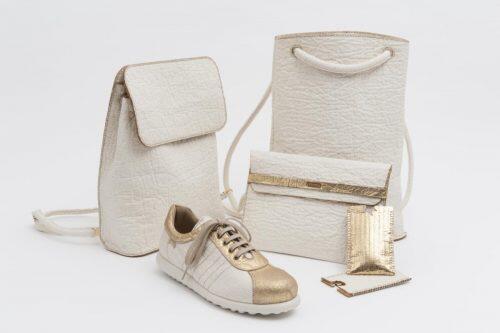Real-leather is a preference of many people around the world, and perhaps, it is not “so silly”, as some say, to pay more attention to what’s happening to animals, in order to get our final “luxurious” pieces.
Each year, more than a billion animals are slaughtered by the global leather industry, according to PETA. Many of these animals endure all the horrors of factory farming, including extreme crowding and confinement, deprivation, and unanesthetized castration, branding, tail-docking, and dehorning, as well as cruel treatment during transport and slaughter.
Most leather is made from the skins of cattle, but leather is also made from pigs, horses, snakes, alligators, zebras, kangaroos, elephants, and many others.
Now, imagine wearing a jacket made from “Pineapple leather”. Yes, it is the common fruit you know. “Pinatex” is all about leather made from pineapple fiber.
This new type of leather was introduced in the Greenshowroom Salonshow, part of the AW Mercedes Benz Berlin Fashion Week.
Pinatex mentioned on its website that “the fibres that make Piñatex™ come from pineapple leaves. The fibres are extracted from the leaves during a process called decortication, which is done at the plantation by the farming community. Furthermore, the by-product of decortication is bio-mass, which can be further converted into organic fertilizer or bio-gas”.
Both the extraction of the fibers and the consequent bio-mass will bring added revenue stream to the farming communities.
The fibres then undergo an industrial process to become a nonwoven textile, which is the base of our material Piñatex™.
The final step in the making of Piñatex™ takes place at a textile finishing company in Spain, where the finishing process is done before being shipped all over the world.
Piñatex™ was created by Dr Carmen Hijosa. Carmen’s journey began in Spain, but her career has taken her across the globe, from Ireland to Germany, to the UK and The Philippines. She worked in both the design and manufacture of leather goods for many years before going to the Philippines to carry out further research into the development of products made from natural fibres.
A breakthrough came when she realized that she could make a non-woven textile, a fabric bonded together without knitting or weaving, from the long fibres found in pineapple leaves.
Ananas Anam earned it the 2016 Award for Materials Innovation from the Arts Foundation UK and the Innovation Award at the 2015 PETA UK Vegan Fashion Awards.
The “PETA-Approved Vegan” logo ensures designers and retailers can highlight their cruelty-free items and raise awareness of sustainable and ethical fashion.












